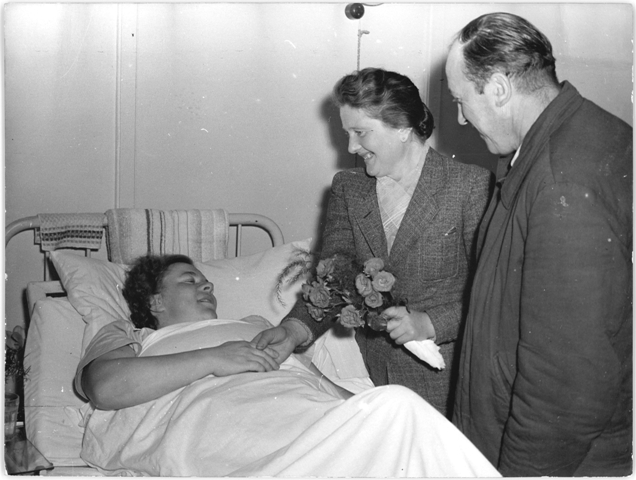Source

Source: © Bundesarchiv Bild 183-76601-0001
This photo produced for the official GDR news agency ADN praised the improvements for expectant mothers that followed in the wake of the 1950 passage of the “Law on the Protection of Mothers and Children and the Rights of Women.” The law, which formally proclaimed the legal equality of men and women, also stipulated the construction of numerous clinics and childcare facilities, especially in rural areas. Female farmers and agricultural workers were no longer supposed to be sent to faraway clinics to deliver their babies; instead, they were supposed to be cared for close to home. The female farmer shown below not only had positive things to say about the rural clinic in which her daughter was born; she also spoke about the ostensible improvement in her situation brought about by the collectivization of agriculture. The caption reads: “Ten years of the ‘Law on the Protection of Mothers and Children’ – the world changed for ten thousand female farmers. For ten thousand female farmers in the district of Halle, as in the whole Republic, the ‘Law on the Protection of Mothers and Children and the Rights of Women,’ which was passed ten years ago by the People’s Parliament, brought a future that they could barely have dreamed of before. Gerda Habermann, a cooperative farmer from the Agricultural Production Cooperative ‘New Germany’ in Billroda-Tauhardt (Nebra district), is among these numerous women. Just a few days earlier, the 32-year-old gave birth to a baby girl at the modern rural ambulatory clinic in Bad Bibra. “I am happy that I could give birth here,” she said. “We have been lovingly cared for day and night and practically our every wish was anticipated. As a female farmer, one is particularly appreciative of this wonderful situation, because, seven and eleven years ago, when my two sons were born and I was still an individual farmer, everything was much, much harder.”

Source: © Bundesarchiv Bild 183-76601-0001